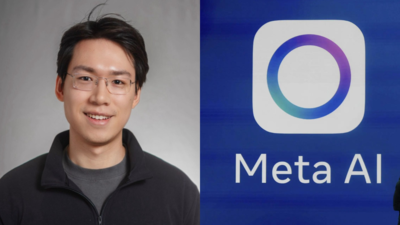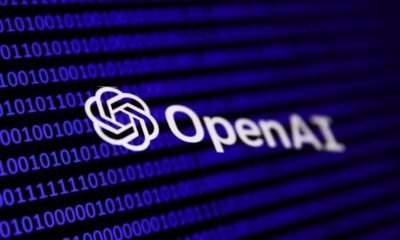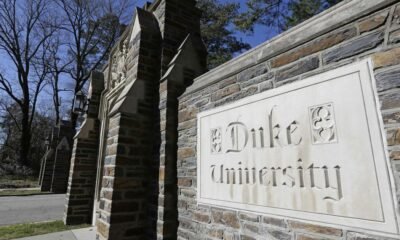AI Research
AI companies are throwing million-dollar paychecks at AI PhDs

Larry Birnbaum, a professor of computer science at Northwestern University was recruiting a promising PhD to become a graduate researcher. Simultaneously, Google was wooing the student. And when he visited the tech giant’s campus in Mountain View, Calif., the company slated him to chat with its cofounder Sergey Brin and CEO Sundar Pichai, who are collectively worth about $140 billion and command over 183,000 employees.
“How are we going to compete with that?” Birnbaum asks, noting that PhDs in corporate research roles can make as much as five times professorial salaries, which average $155,000 annually. “That’s the environment that every chair of computer science has to cope with right now.”
Though Birnbaum says these recruitment scenarios have been “happening for a while,” the phenomenon has reportedly worsened as salaries across the industry have been skyrocketing. The trend recently became headline news after reports surfaced of Meta offering to pay some highly experienced AI researchers between seven- and eight-figure salaries. Those offers—coupled with the strong demand for leaders to propel AI applications—may be helping to pull up the salary levels of even newly minted PhDs. Even though some of these graduates have no professional experience, they are being offered the types of comma-filled levels traditionally reserved for director- and executive-level talent.
Some academics fear a ‘brain drain’
Engineering professors and department chairs at Johns Hopkins, University of Chicago, Northwestern, and New York University interviewed by Fortune are divided on whether these lucrative offers lead to a “brain drain” from academic labs.
The brain drain camp believes this phenomenon depletes the ranks of academic AI departments, which still do important research and also are responsible for training the next generation of PhD students. At the private labs, the AI researchers help juice Big Tech’s bottom line while providing, in these critics’ view, no public benefit. The unconcerned argue that academia is a thriving component of this booming labor market.
Anasse Bari, a professor of computer science and director of the predictive analytics and AI research lab at New York University, says that the corporate opportunities available to AI-focused academics is “significantly” affecting academia. “My general theory is that If we want a responsible future for AI, we must first invest in a solid AI education that upholds these values, cultivating thoughtful AI practitioners, researchers, and educators who will carry this mission forward,” he wrote to Fortune via email, emphasizing that despite receiving “many” offers for industry-side work, his NYU commitments take precedence.
In the days before ChatGPT, top AI researchers were in high demand, just as today. But many of the top corporate AI labs, such as OpenAI, Google DeepMind, and Meta’s FAIR (Fundamental AI Research), would allow established academics to keep their university appointments, at least part-time. This would allow them to continue to teach and train graduate students, while also conducting research for the tech companies.
While some professors say that there’s been no change in how frequently corporate labs and universities are able to reach these dual corporate-academic appointments, others disagree. NYU’s Bari says this model has declined owing to “intense talent competition, with companies offering millions of dollars for full-time commitment which outpaces university resources and shifts focus to proprietary innovation.”
Commitment to their faculty appointments remains true for all the academics Fortune interviewed for this story. But professors like Henry Hoffman, who chairs the University of Chicago’s Department of Computer Science, has watched his PhD students get courted by tech companies since he began his professorship in 2013.
“The biggest thing to me is the salaries,” he says. He mentions a star student with zero professional experience who recently dropped out of the UChicago PhD program to accept a “high six-figure” offer from ByteDance. “When students can get the kind of job they want [as students], there’s no reason to force them to keep going.”
While PhDs thrive, undergrad computer science students struggle
The job market for computer science and engineering PhDs who study AI sits in stark contrast to the one faced by undergraduates in the field. This degree-level polarization exists because many of those with bachelor’s degrees in computer science would traditionally find jobs as coders. But LLMs are now writing large portions of code at many companies, including Microsoft and Salesforce. Meanwhile, most AI-relevant PhD students have their pick of frothy jobs—in academia, tech, and finance. These graduates are courted by the private sector because their training propels AI and machine learning applications, which, in turn, can increase revenue opportunities for model makers.
There were 4,854 people who graduated with AI-relevant PhDs in mathematics and computer science across U.S. universities, according to 2022 data. This number has increased significantly—by about 20%—since 2014. These PhDs’ postgraduate employment rate is greater than those graduating with bachelor’s degrees in similar fields. And in 2023, 70% of AI-relevant PhDs took private sector jobs postgrad, a huge increase from two decades ago when just 20% of these grads accepted corporate work, per MIT.
Make no mistake: PhDs in AI, computer science, applied mathematics, and related fields have always had lucrative opportunities available after graduation. Until now, one of the most financially rewarding paths was quantitative research at hedge funds: All-in compensation for PhDs fresh out of school can climb to $1 million–plus in these roles. It’s a compelling pitch, especially for students who’ve spent up to seven years living off meager stipends of about $40,000 a year.
The all-but-assured path to prosperity has made relevant PhD programs in computer science and math extremely popular. AI and machine learning are the most popular disciplines among engineering PhDs, according to a 2023 Computing Research Association survey. UChicago computer science department chair Hoffman says that PhD admissions applications have surged by about 12% in the past few years alone, pressuring him and his colleagues to hire new faculty to increase enrollment and meet the demand.
Applications to AI PhD programs are on the rise
Though Trump’s federal funding cuts to universities have significant impacts on research in many departments, they may be less pertinent to those working on AI-related projects. This is partially because some of this research is funded by corporations. Google, for example, is collaborating with the University of Chicago to research trustworthy AI.
That dichotomy probably underscores Johns Hopkins University’s decision to open its Data Science and AI Institute: a $2 billion five-year effort to enroll 750 PhD students in engineering disciplines and hire over 100 new tenure-track faculty members, making it one of the largest PhD programs in the country.
“Despite the dreary mood elsewhere, the AI and data science area at Hopkins is rosy,” says Anton Dahbura, the executive director of Johns Hopkins’ Information Security Institute and codirector of the Institute for Assured Autonomy, likely referring to his university’s cut of 2,000 workers after it lost $800 million in federal funding earlier this year. Dahbura supports this argument by noting that Hopkins received “hundreds” of applications for professor positions in its Data Science and AI Institute.
For some, the reasons to remain in academia are ethical.
Luís Amaral, a computer science professor at Northwestern, is “really concerned” that AI companies have overhyped the capabilities of their large language models and that their strategies will breed catastrophic societal implications, including environmental destruction. He says of OpenAI leadership, “If I’m a smart person, I actually know how bad the team was.”
Because most corporate labs are largely focused on LLM- and transformer-based approaches, if these methods ultimately fall short of the hype, there could be a reckoning for the industry. “Academic labs are among the few places actively exploring alternative AI architectures beyond LLMs and transformers,” says NYU’s Bari, who is researching creative applications for AI using a model based on birds’ intelligence. “In this corporate-dominated landscape, academia’s role as a hub for nonmainstream experimentation has likely become more important.”
AI Research
Artificial intelligence, rising tuition discussed by educational leaders at UMD

DULUTH, Minn. (Northern News Now) – A panel gathered at UMD’s Weber Music Hall Friday to discuss the future of higher education.
The conversation touched on heavy topics like artificial intelligence, rising tuition costs, and how to provide the best education possible for students.
Almost 100 people listened to conversations on the current climate of college campuses, including UMD Associate Dean of the Swenson College of Engineering and Science Erin Sheets.
“We’re in a unique and challenging time, with respect to the federal landscape and state landscape,” said Sheets.
The three panelists addressed current national changes, including rising tuition costs and budget cuts.
“That is going to be a structural shift we really are going to have to pay attention to, if we want to continue to commit for all students to have the opportunity to attend college,” said panelist and Managing Director of Waverly Foundation Lande Ajose.
Last year alone, the University of Minnesota system was hit with a 3% budget cut on top of a loss of $22 million in federal grants. This resulted in a 6.5% tuition increase for students.
Even with changing resources, the panel emphasized helping students prepare for the future, which they said includes the integration of AI.
“As students graduate, if they are not AI fluent, they are not competitive for jobs,” said panelist and University of Minnesota President Rebecca Cunningham.
Research shows that the use of AI in the workplace has doubled in the last two years to 40%.
While AI continues to grow every day, both students and faculty are learning to use it and integrate it into their curriculum.
“These are tools, they are not a substitute for a human being. You still need the critical thinking, you need the ethical guidelines, even more so,” said Sheets.
Following the panel, UMD hosted a campus-wide celebration to mark the inauguration of Chancellor Charles Nies.
Click here to download the Northern News Now app or our Northern News Now First Alert weather app.
Copyright 2025 Northern News Now. All rights reserved.
AI Research
AI startup CEO who has hired several Meta engineers says: Reason AI researchers are leaving Meta is, as founder Mark Zuckerberg said, “Biggest risk is not taking …”

Shawn Shen, co-founder and CEO of the AI startup Memories.ai, has stated that some researchers are leaving Facebook-parent Meta due to frequent company reorganisations and a desire to take on bigger risks. Shen, who left Meta himself last year, notes that constant changes in managers and goals can be frustrating for researchers, leading them to seek opportunities at other companies and startups. Shen’s startup, which builds AI to understand visual data, recently announced a plan to offer up to $2 million compensation packages to researchers from top tech companies. Memories.ai has already hired Chi-Hao Wu, a former Meta research scientist, as its chief AI officer. Shen also referenced a statement from Meta CEO Mark Zuckerberg who earlier said that the “the biggest risk is not taking any risks.”
What startup CEO Shen said about AI researchers leaving Meta
In an interview with Business Insider, Shen said: “Meta is constantly doing reorganizations. Your manager and your goals can change every few months. For some researchers, it can be really frustrating and feel like a waste of time. So yes, I think that’s a driver for people to leave Meta and join other companies, especially startups.There’s other reasons people might leave. I think the biggest one is what Mark (Zuckerberg) has said: ‘In an age that’s evolving so fast, the biggest risk is not taking any risks. So why not do that and potentially change the world as part of a trillion-dollar company?’We have already hired Eddy Wu, our Chief AI Officer who was my manager’s manager at Meta. He’s making a similar amount to what we’re offering the new people. He was on their generative AI team, which is now Meta Superintelligence Labs. And we are already talking to a few other people from MSL and some others from Google DeepMind.”
What Shen said about hiring Meta AI researchers for his startup
Shen noted that he’s offering AI researchers who are leaving Meta pay packages of $2 million to work with his startup. He said: “It’s because of the talent war that was started by Mark Zuckerberg. I used to work at Meta, and I speak with my former colleagues often about this. When I heard about their compensation packages, I was shocked — it’s really in the tens of millions range. But it shows that in this age, AI researchers who make the best models and stand at the frontier of technology are really worth this amount of money. We’re building an AI model that can see and remember just like humans. The things that we are working on are very niche. So we are looking for people who are really, really good at the whole field of understanding video data.”He even explained that his company is prioritising hires who are willing to take more equity than cash, allowing it to preserve its financial runway. These recruits will be treated as founding members rather than employees, with compensation split between cash and equity depending on the individual, Shen added.Over the next six months, the AI startup is planning to add three to five people, followed by another five to ten within a year, alongside efforts to raise additional funding. Shen believes that investing heavily in talent will strengthen, not hinder, future fundraising.
AI Research
AARP warns of “Grandparent Scams”

MONTGOMERY, Ala. (WSFA) – While artificial intelligence is rapidly transforming our world, a troubling trend shows scammers using it to steal from seniors, specifically grandparents.
You’ve probably heard the phrase ‘seeing is believing’ your whole life. But in an age of artificial intelligence, the turn of phrase doesn’t exactly stand the test of time. When it’s in the wrong hands, this new technology can make our senior citizens, who didn’t grow up in the digital age, a vulnerable population.
“One of the ways we see that being done is with what’s known as the grandparent scam,” Jamie Harding, AARP of Alabama Communications director, said. “The grandparent scam is basically, it usually happens late at night, they’re asleep, and someone calls them purporting to be their grandchild, they’re in trouble, they need money immediately.”
However, it isn’t actually their grandchild on the other end of the phone. Scammers have used AI technology to replicate the sound of their grandchild’s voice to try to take money.
“These are very sophisticated international crime rings, and they have access to a lot of very sophisticated technology,” Harding said.
To protect your family from these scams, Harding suggests having a code word that every member of your family knows so you can be sure it’s actually your loved one calling.
She also advises you not to answer phone calls from unknown numbers and to keep your personal information off the internet.
Not reading this story on the WSFA News App? Get news alerts FASTER and FREE in the Apple App Store and the Google Play Store!
Copyright 2025 WSFA. All rights reserved.
-

 Business1 week ago
Business1 week agoThe Guardian view on Trump and the Fed: independence is no substitute for accountability | Editorial
-
Tools & Platforms4 weeks ago
Building Trust in Military AI Starts with Opening the Black Box – War on the Rocks
-

 Ethics & Policy1 month ago
Ethics & Policy1 month agoSDAIA Supports Saudi Arabia’s Leadership in Shaping Global AI Ethics, Policy, and Research – وكالة الأنباء السعودية
-

 Events & Conferences4 months ago
Events & Conferences4 months agoJourney to 1000 models: Scaling Instagram’s recommendation system
-

 Jobs & Careers2 months ago
Jobs & Careers2 months agoMumbai-based Perplexity Alternative Has 60k+ Users Without Funding
-

 Education2 months ago
Education2 months agoVEX Robotics launches AI-powered classroom robotics system
-

 Podcasts & Talks2 months ago
Podcasts & Talks2 months agoHappy 4th of July! 🎆 Made with Veo 3 in Gemini
-

 Funding & Business2 months ago
Funding & Business2 months agoKayak and Expedia race to build AI travel agents that turn social posts into itineraries
-

 Education2 months ago
Education2 months agoMacron says UK and France have duty to tackle illegal migration ‘with humanity, solidarity and firmness’ – UK politics live | Politics
-

 Podcasts & Talks2 months ago
Podcasts & Talks2 months agoOpenAI 🤝 @teamganassi





















